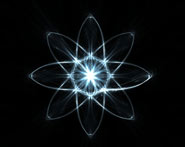


 الفيزياء الكلاسيكية
الفيزياء الكلاسيكية
 الكهربائية والمغناطيسية
الكهربائية والمغناطيسية
 علم البصريات
علم البصريات
 الفيزياء الحديثة
الفيزياء الحديثة
 النظرية النسبية
النظرية النسبية
 الفيزياء النووية
الفيزياء النووية
 فيزياء الحالة الصلبة
فيزياء الحالة الصلبة
 الليزر
الليزر
 علم الفلك
علم الفلك
 المجموعة الشمسية
المجموعة الشمسية
 الطاقة البديلة
الطاقة البديلة
 الفيزياء والعلوم الأخرى
الفيزياء والعلوم الأخرى
 مواضيع عامة في الفيزياء
مواضيع عامة في الفيزياء|
Read More
Date: 13-10-2016
Date: 5-10-2016
Date: 24-11-2016
|
System of Particles
A system of particles is composed of n freely moving particles. Is the mass of this system equal to the sum of the masses of the individual particles?
Answer
No and yes! Except in the special circumstance described below, the answer is no. Energy and momentum are additive, but not mass. Mass is a measure of the magnitude of the energy momentum 4-vector. From the total energy E and the total momentum P can be determined the mass M of the system:M2c4 = E2 – P2c2. Therefore the mass M of the system is greater than the sum of the masses of its particles by the amount equal to the total kinetic energy of all the particles as seen in the frame in which the total momentum is zero. The exception “yes” occurs when all the particles move in the same direction with the same speed that is, have the same velocity.
The value of defining the mass in this relativistic fashion means that M determines the system’s inertia, its resistance to acceleration by a force that acts on the system as a whole. A box with a hot gas of particles has more mass than the same box after the gas has cooled. Also, the box of hot gas exerts a greater gravitational pull on a test particle. In addition, a box of photons exerts a gravitational pull on a test particle, and vice versa.



|
|
|
|
تفوقت في الاختبار على الجميع.. فاكهة "خارقة" في عالم التغذية
|
|
|
|
|
|
|
أمين عام أوبك: النفط الخام والغاز الطبيعي "هبة من الله"
|
|
|
|
|
|
|
مجمع العلقمي للزائرين يقدم خدمات متنوعة لزائري المراقد المقدسة في كربلاء
|
|
|